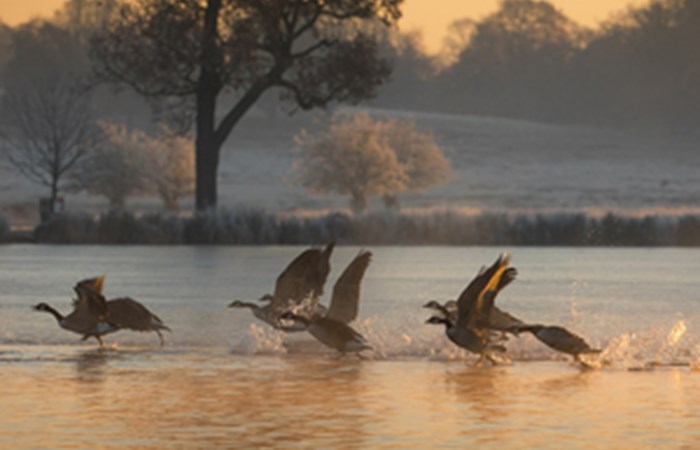Animal Plant Health Agency

Contents:
- Latest situation
- All bird flu cases and disease zones
- Bird flu guidance
- Vaccines
- Latest GOV.UK news stories
- Risk levels and outbreak assessments
- Wild birds
- Bird flu webinars
- Defra policies and contingency plans
- Bird flu legislation
Latest situation
Great Britain (England, Scotland and Wales) is in an avian influenza prevention zone (AIPZ). By law you must follow strict biosecurity rules to prevent bird flu and stop it spreading.
In England and Wales the AIPZ also means you must house your birds to protect them from bird flu.
In the United Kingdom, there have been 157 confirmed cases of highly pathogenic avian influenza (HPAI) H5N1 since 1 October 2022:
- 139 cases in England
- 14 cases in Scotland
- 3 cases in Wales
- 1 case in Northern Ireland
There have been 273 cases of (HPAI)H5N1 in England since the H5N1 outbreak started in October 2021.
Check if youre in a bird flu disease zone on the map.
If youre in a bird flu disease zone you must follow the rules for that zone and check if you need a licence to move poultry, poultry by-products, eggs, material or mammals.
Further update 9 January 2023
Highly pathogenic avian influenza (HPAI) H5N1 was confirmed in commercial poultry on 9 January 2023 at a premises near Langwathby, Eden, Cumbria (AIV2023/02). A 3km protection zone and 10km surveillance zone have been put in place around the premises. All poultry on the premises will be humanely culled.
Update 9 January 2023
The avian influenza prevention zone (AIPZ) has been amended. It introduces a new measure for wild game birds caught up during the open season (under the Game Act 1831) - they must not be moved until a minimum of 21 days from the date of catching-up has elapsed.
These measures apply from 12:00 on 9 January 2023 and will remain in force until the declaration is amended or revoked by a further declaration in writing.
Details of the new measures are in the AIPZ declaration.
Update 8 January 2023
Highly pathogenic avian influenza (HPAI) H5N1 was confirmed in a mixed flock of other captive birds on 11 October 2022 at a premises near Soham, East Cambridgeshire, Cambridgeshire (AIV 2022/107). Following successful completion of disease control activities and surveillance in the zone, the 3km captive bird (monitoring) controlled zone has ended.
All bird flu cases and disease zones
Find details of all bird flu cases and disease zones in England.
Find details of bird flu cases in Scotland, cases in Wales and cases in Northern Ireland.
Bird flu guidance
Find out how to:
- spot and report bird flu in poultry and other captive birds
- report dead wild birds
- prevent bird flu and stop it spreading
- follow the rules in disease zones
- house your birds safely
Vaccines
You cannot vaccinate poultry or most captive birds against bird flu in England.
You can only vaccinate zoo birds in England if you meet eligibility criteria and get authorisation from APHA. Only zoos or collections holding a current zoo licence can apply for vaccination.
Defra continues to invest in bird flu research and monitors the situation globally.
We work with the Veterinary Medicines Directorate (VMD) to monitor the development of vaccines for birds.
Latest GOV.UK news stories
Mandatory housing measures for all poultry and captive birds are now in force across England.
Find details of the measures that apply in England: AIPZ declaration including housing measures.
New package of measures announced to support poultry industry with bird flu.
Risk levels and outbreak assessments
The risk of highly pathogenic (HPAI) avian influenza H5 in wild birds in Great Britain is assessed as very high (the event occurs almost certainly).
The risk of poultry exposure to HPAI H5 in Great Britain is assessed as:
- high (event occurs very often) (with low uncertainty) where there are substantial biosecurity breaches and poor biosecurity
- medium (event occurs regularly) (with high uncertainty) where good biosecurity is applied
Find details of the evidence that supported these decisions in the:
- risk and outbreak assessments
- weekly reports of bird flu cases in wild birds in Great Britain
- findings of bird flu in non-avian wildlife
The UK Health Security Agency (UKHSA) advise that bird flu is primarily a disease of birds and the risk to the general publics health is very low.
The Food Standards Agency (FSA) has said bird flu poses a very low food safety risk for UK consumers. Properly cooked poultry and poultry products, including eggs, are safe to eat.
Wild birds
Find out how to report dead wild birds.
Defra?has set out practical information to support land managers, the public and ornithological and environmental organisations in t
